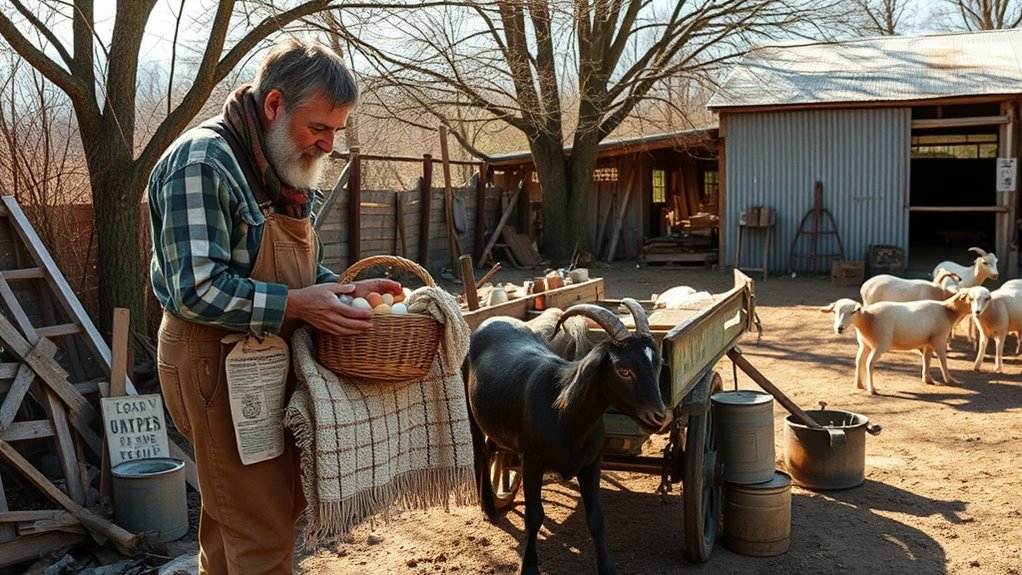During hard times, bartering and trading on your homestead can be lifesavers. You can exchange goods like vegetables or eggs with neighbors, or offer skills such as handyman services for firewood or other resources. Joining local barter fairs or online networks helps you connect with others who value resourcefulness. These exchanges strengthen your community ties, boost self-sufficiency, and reduce reliance on cash and store inventories. Keep exploring how building these relationships can turn challenges into opportunities.
Key Takeaways
- Bartering allows homesteaders to exchange goods and services directly, reducing reliance on cash during economic hardships.
- Building local networks and participating in barter fairs enhances trust and access to a wider community for trades.
- Swapping surplus produce, skills, or resources helps sustain homestead productivity when cash is scarce.
- Online barter platforms facilitate broader connections, increasing trade opportunities beyond immediate neighbors.
- Engaging in barter strengthens community ties, promotes resourcefulness, and supports local resilience in tough times.

Have you ever wondered how homesteaders manage to get what they need without relying solely on cash? In tough times, cash can become scarce or unreliable, making alternative methods like bartering and trade essential. One effective strategy is engaging in sustainable exchange, where you swap goods and services directly with neighbors or community members. This approach reduces dependence on money and fosters stronger local ties. Participating in barter networks can streamline this process, connecting you with others who are enthusiastic to trade items or skills. These networks often operate through in-person swaps, online platforms, or local events, making it easier to find someone with what you need and who needs what you have.
Swapping goods and services locally reduces reliance on cash and strengthens community bonds through sustainable exchange.
When you become part of a barter network, you tap into a broader community that values resourcefulness and mutual support. It’s not just about trading random items but about creating a system where everyone benefits. For example, you might trade excess vegetables for eggs, or offer handyman skills in exchange for firewood. These exchanges help you conserve cash, reduce waste, and make the most of what your land and skills produce. Plus, engaging with others in sustainable exchange builds relationships rooted in trust, making future trades more straightforward and reliable.
Barter networks often encourage a give-and-take attitude, where the focus isn’t solely on immediate gain but on fostering ongoing relationships. You’ll find that over time, these networks become a crucial part of your homestead’s resilience. They allow you to access needed items without draining your resources or relying on stores that may be out of stock during hard times. Also, they promote local sustainability, reducing transportation emissions and supporting your community’s economy.
Getting involved in these networks can be as simple as connecting with neighbors, joining online barter groups, or attending local barter fairs. Once you’re in, you’ll discover how versatile and practical sustainable exchange can be. It’s a way to keep your homestead thriving when cash flow is limited, and it creates a sense of community that’s often missing in modern, cash-driven economies. By leveraging barter networks, you turn what might seem like limitations into opportunities for resourcefulness, cooperation, and growth. In challenging times, this approach can be a game changer, helping you maintain your homestead’s independence and self-sufficiency while strengthening bonds with those around you.
Frequently Asked Questions
How Do I Establish Fair Barter Agreements With Neighbors?
To establish fair barter agreements with neighbors, focus on building community trust and sharpening your negotiating skills. Be transparent about what you’re offering and what you need in return. Communicate clearly, listen actively, and aim for mutually beneficial deals. Respect their needs and guarantee both parties understand and agree on terms. Over time, consistent honesty and fair dealings will strengthen relationships and make barter agreements more successful.
What Are Common Items Traded on Homestead Barter Markets?
Did you know that livestock trading and homestead tools are among the most common items in barter markets? You often exchange fresh eggs, homemade preserves, or surplus produce for tools or livestock feed. These items help sustain your homestead and build strong neighborly ties. When bartering, focus on what you have plenty of and what others need most, making trades fair and beneficial for everyone involved.
How Can I Protect Myself From Scams During Barter Transactions?
To prevent scams during barter transactions, focus on trust building by clearly communicating expectations and documenting agreements. Always verify the other person’s reputation or references if possible. Use secure methods of exchange and avoid exchanging valuable items without proper assurance. Scam prevention also involves staying alert for red flags, like vague details or pushy behavior. Trust your instincts, and never hesitate to walk away if something feels off.
Are There Legal Considerations for Bartering in Rural Areas?
You should be aware of legal considerations when bartering in rural areas, including legal compliance and tax implications. Make sure to monitor your barter transactions accurately, as the IRS considers bartered goods and services taxable income. Consult local laws to ensure you’re following regulations, and keep detailed records to avoid issues during tax season. Staying informed helps protect you and keeps your barter activities legal and hassle-free.
How Do I Value Goods Accurately for Barter Purposes?
To accurately value goods for barter, you should start with a thorough value assessment by researching current market prices. Use price comparison tools or local listings to understand what similar items sell for. Consider the item’s condition, rarity, and demand. By doing this, you guarantee fair exchanges, build trust, and make sure both parties feel satisfied with the trade. Always be honest and transparent during the valuation process.
Conclusion
Just like a sturdy tree offers its shade in tough times, your ability to barter and trade keeps your homestead resilient. When resources seem scarce, your skills and connections become the roots that hold everything together. Remember, in hard times, these exchanges are the branches that reach out, offering hope and sustenance. Embrace the spirit of giving and sharing, for it’s the foundation that sustains your homestead through any storm.










